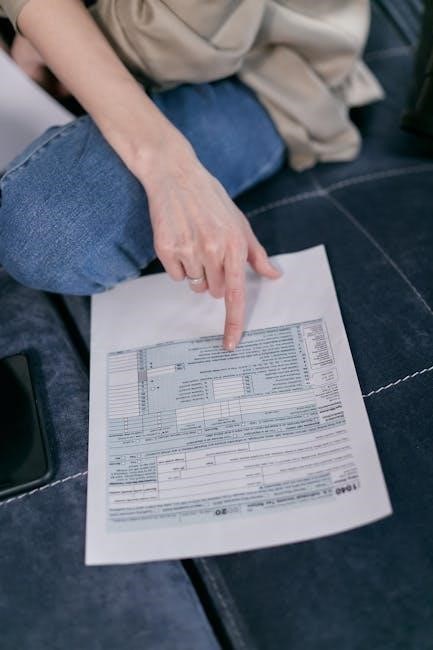Form 990 Schedule C is used by nonprofits to report political campaign and lobbying activities, ensuring transparency and compliance with IRS regulations for tax-exempt organizations.
1.1 Overview of Form 990 and Schedule C
Form 990 is the annual information return for nonprofits, detailing financial data, governance, and compliance. Schedule C is a critical supplement for organizations engaged in political campaigns or lobbying activities, ensuring transparency and adherence to IRS regulations. Required for section 501(c) and 527 organizations, accurate reporting on Schedule C is essential to maintain tax-exempt status and avoid penalties.
1.2 Importance of Schedule C for Nonprofits
Schedule C ensures nonprofits disclose political campaign and lobbying activities, crucial for maintaining transparency and public trust. It helps organizations comply with IRS regulations, avoid penalties, and retain tax-exempt status. Accurate reporting on Schedule C is vital for accountability and demonstrating adherence to legal standards, safeguarding an organization’s reputation and operational continuity.
Purpose of Schedule C
Schedule C is used by nonprofits to report political campaign and lobbying activities, ensuring compliance with IRS regulations and maintaining transparency for tax-exempt organizations.
2.1 Requirements for Political Campaign Activities
Organizations must report political campaign activities, including interventions in elections, to ensure compliance with IRS rules. Disclosure includes expenditures and activities, with specific requirements for section 501(c)(3) entities to maintain tax-exempt status and avoid penalties.
2.2 Requirements for Lobbying Activities
Nonprofits must disclose lobbying activities, including direct and grassroots efforts, under IRS guidelines. Organizations exceeding specific expenditure thresholds must report details, ensuring compliance with tax-exempt status rules. Accurate reporting is crucial to avoid penalties and maintain eligibility for tax-exempt benefits under section 501(c)(3) or other applicable codes.
2.3 Types of Organizations Required to File Schedule C
Organizations filing Form 990 or 990-EZ, such as section 501(c)(3), 501(c)(4), and 527 entities, must submit Schedule C if they engage in political campaigns or lobbying. This requirement ensures transparency and compliance with IRS regulations for tax-exempt organizations. Proper reporting is essential to maintain exempt status and avoid penalties.

Structure of Schedule C
Schedule C is divided into Part I for political campaign activities and Part II for lobbying activities, ensuring detailed reporting of each area.
3.1 Part I: Political Campaign Activities
Part I of Schedule C requires nonprofits to disclose political campaign activities, including expenditures, contributions, and details of direct or indirect political interventions, ensuring compliance with IRS rules for tax-exempt organizations.
3.2 Part II: Lobbying Activities
Part II of Schedule C focuses on reporting lobbying activities, including expenditures, contributions, and details of legislative or grassroots efforts. Nonprofits must disclose efforts to influence legislation or public policy, ensuring compliance with IRS rules for tax-exempt organizations engaged in lobbying.

Instructions for Completing Schedule C
Provide detailed information on political campaign and lobbying activities, ensuring accuracy and compliance with IRS requirements for tax-exempt organizations filing Form 990.
4.1 Line-by-Line Guide for Part I
Part I of Schedule C requires detailed reporting of political campaign activities, including financial data and disclosures. Each line corresponds to specific sections of the form, ensuring accurate compliance with IRS regulations for tax-exempt organizations engaging in political activities. Proper documentation and adherence to instructions are crucial to avoid penalties and maintain transparency.
4.2 Line-by-Line Guide for Part II
Part II of Schedule C focuses on lobbying activities, requiring nonprofits to report expenses, grassroots efforts, and specific issues. Each line must be completed accurately, ensuring compliance with IRS rules. Proper documentation and adherence to instructions are essential to avoid penalties and maintain transparency in lobbying disclosures for tax-exempt organizations.

Filing Requirements and Due Dates
Nonprofits must file Schedule C with Form 990, 990-EZ, or 990-PF by the respective deadlines, typically May 15 or November 15 for extended returns, ensuring timely compliance with IRS requirements.
5.1 Forms Requiring Schedule C (990, 990-EZ, 990-PF)
Schedule C must be submitted with Form 990, 990-EZ, or 990-PF if the organization engages in political campaigns or lobbying. It applies to 501(c) and 527 organizations, ensuring compliance with IRS disclosure requirements for tax-exempt entities.
5.2 Important Deadlines for 2024 and 2025
The IRS mandates strict deadlines for filing Form 990, 990-EZ, and 990-PF, with Schedule C. For tax year 2024, the deadline is May 15, 2025, with a six-month extension available. Organizations must adhere to these dates to avoid penalties and maintain compliance with IRS regulations for tax-exempt status.
5.3 Extension of Filing Deadlines
Organizations can request a six-month extension for filing Form 990, including Schedule C, by submitting Form 8868. This extension allows nonprofits additional time to prepare accurate documentation without facing penalties, ensuring compliance with IRS requirements and maintaining tax-exempt status.

Submitting Schedule C
Schedule C must be submitted electronically or by mail, attached to Form 990 or 990-EZ. Ensure accuracy and compliance with IRS guidelines to avoid penalties.
6.1 Electronic Filing Requirements
Electronic filing of Schedule C requires organizations to submit it through IRS-approved software. Ensure all data is accurate and complete, as incomplete submissions may cause processing delays. Attach Schedule C to Form 990 or 990-EZ and verify compliance with IRS standards for electronic submissions to maintain timely processing and avoid penalties.
6.2 Mail-in Submission Process
Organizations submitting Schedule C by mail must attach it to Form 990, 990-EZ, or 990-PF. Ensure the form is fully completed and signed. Mail the package to the IRS address listed for your organization’s filing location. Use certified mail for tracking and proof of delivery. Incomplete submissions may result in processing delays or additional correspondence from the IRS.
Key Definitions and Terminology
Understanding key terms like lobbying, political campaigns, and exempt organizations is crucial for accurately completing Schedule C, ensuring compliance with IRS definitions and reporting requirements.
7.1 Lobbying Activities
Lobbying activities involve influencing legislation or government decisions. Under Schedule C, nonprofits must report efforts to sway public opinion or policymakers, including expenditures and targeted issues, ensuring transparency in their advocacy efforts and compliance with IRS guidelines for tax-exempt organizations.
7.2 Political Campaign Activities
Political campaign activities involve promoting or opposing candidates. Under Schedule C, nonprofits must report expenditures for campaign interventions, including advertisements, donations, or communications, ensuring compliance with IRS rules to maintain tax-exempt status and avoid penalties related to political engagement.
7.3 Other Relevant Terms
Key terms include “lobbying activities,” referring to advocacy for legislation, and “political campaign activities,” involving candidate promotion. “Exempt organizations” under Section 501(c) and Section 527 must accurately report these activities to comply with IRS regulations and maintain transparency, avoiding penalties and ensuring public trust in their operations and financial disclosures.

Common Mistakes to Avoid
Common errors include incorrect reporting of lobbying or political activities, missing deadlines, and submitting incomplete or inaccurate information, which can lead to penalties or compliance issues.
8.1 Incorrect Reporting of Activities
Incorrect reporting of lobbying or political activities can lead to penalties and compliance issues. Misclassifying or omitting such activities may result in IRS scrutiny and potential loss of tax-exempt status. Accurate record-keeping and understanding definitions are crucial to avoid errors in Schedule C submissions.
8.2 Missing Deadlines
Missing deadlines for filing Schedule C can result in penalties and fines. Late submissions may lead to loss of tax-exempt status or additional IRS scrutiny. Organizations must adhere to IRS timelines for Form 990, 990-EZ, or 990-PF, ensuring timely submissions to avoid compliance issues and maintain good standing with the IRS.
8.3 Incomplete or Inaccurate Information
Incomplete or inaccurate data on Schedule C can trigger IRS audits and penalties. Ensure all details, such as political campaign activities and lobbying expenditures, are accurate. Organizations must carefully review each line item to avoid errors, as discrepancies can lead to legal consequences and jeopardize tax-exempt status.
Public Disclosure Requirements
Nonprofits must make Schedule C publicly available upon request, ensuring transparency in political and lobbying activities, while protecting sensitive information as allowed by IRS regulations and guidelines.
9.1 Public Inspection of Schedule C
Schedule C must be made available for public inspection upon request. Organizations filing Form 990 or 990-EZ, particularly Section 527 political organizations, are subject to these rules. The IRS requires transparency in reporting political campaign and lobbying activities, ensuring accountability. However, sensitive information may be redacted to protect confidentiality, as permitted by IRS guidelines.
9.2 Protecting Sensitive Information
When submitting Schedule C, organizations must redact sensitive information to prevent unauthorized disclosure. The IRS allows redaction of certain details to protect confidentiality, ensuring compliance with privacy laws. However, all required information must still be accurately reported to maintain transparency while safeguarding sensitive data from public exposure.

Relationship Between Schedule C and Other Forms
Schedule C is part of Form 990, 990-EZ, and sometimes 990-PF. It works with other schedules like Schedule O for explanations, ensuring comprehensive reporting of nonprofit activities.
10.1 Connection to Form 990 and Form 990-EZ
Schedule C is directly linked to Forms 990 and 990-EZ, required for nonprofits engaged in political or lobbying activities. It provides detailed disclosures, ensuring compliance and transparency. Organizations must attach Schedule C to these forms, aligning with their filing obligations for accurate reporting of exempt purpose expenditures.
10.2 Interaction with Schedule O
Schedule C interacts with Schedule O, where organizations explain their answers. If questions in Schedule C require additional details, nonprofits must attach Schedule O to provide clarifications, ensuring comprehensive disclosure of political and lobbying activities in compliance with IRS requirements.
Penalties for Non-Compliance
Non-compliance with Schedule C requirements can result in penalties, including fines and loss of tax-exempt status, emphasizing the importance of accurate and timely reporting by nonprofits.
11.1 Financial Penalties
Failure to properly complete Schedule C may result in monetary penalties, including fines for each day filing deadlines are missed or for inaccuracies in reported lobbying or political activities, emphasizing strict compliance with IRS guidelines to avoid financial repercussions on tax-exempt organizations.
11.2 Loss of Tax-Exempt Status
Severe non-compliance with Schedule C requirements, such as intentional misreporting of lobbying activities, can lead to revocation of an organization’s tax-exempt status, significantly impacting its operations and donations, as IRS regulations mandate strict adherence to reporting standards for maintaining exempt status;

Best Practices for Preparing Schedule C
Consult tax professionals for accuracy, maintain detailed records of lobbying and political activities, and thoroughly review IRS guidelines to ensure compliance and avoid errors in reporting.
12.1 Consulting Tax Professionals
Consulting tax professionals ensures accurate preparation of Schedule C, as they provide expertise in navigating complex IRS regulations, reducing errors, and interpreting specific requirements for lobbying and political activities, crucial for maintaining tax-exempt status and compliance with filing deadlines, while offering tailored guidance for unique organizational needs and potential challenges in reporting.
12.2 Maintaining Accurate Records
Maintaining precise and detailed records is vital for completing Schedule C accurately, as it involves tracking all lobbying and political activities, including expenditures, communications, and contributions, ensuring compliance with IRS requirements and facilitating a smooth audit process, while also providing a clear audit trail for all reported information, essential for transparency and accountability in nonprofit operations and reporting.

Resources for Further Assistance
Visit IRS.gov/Form990 for detailed guidance, instructions, and updates on Schedule C. Consulting tax professionals or seeking legal advice is recommended for complex compliance issues and accurate submissions.
13.1 IRS Guidance and Publications
The IRS provides comprehensive guidance for Schedule C through its official website, including detailed instructions, updated forms, and relevant publications. Visit IRS.gov/Form990 for the latest information, ensuring compliance with all regulatory requirements for accurate and timely filings. Additional resources include the IRS Taxpayer Assistance Center and instructional eBooks available for download.
13.2 Professional Assistance Options
Consulting tax professionals, such as Certified Public Accountants (CPAs) or Enrolled Agents, can provide expert guidance on completing Schedule C accurately. Additionally, tax software and consulting firms specialize in nonprofit compliance, offering tailored support for Form 990 and its schedules. Utilizing these resources ensures adherence to IRS regulations and minimizes errors in reporting political and lobbying activities.
